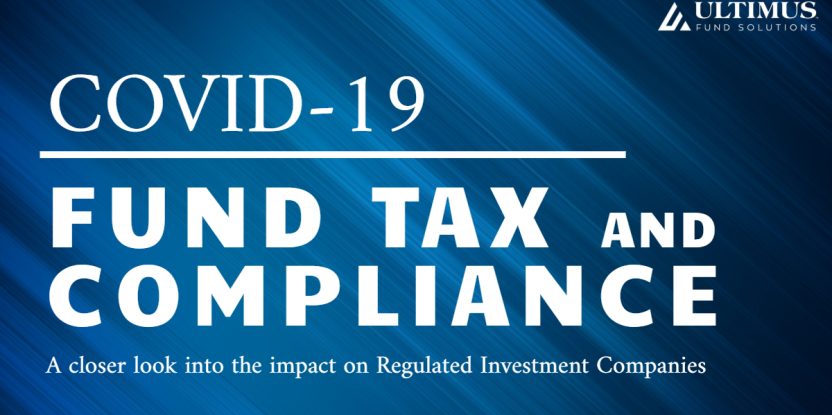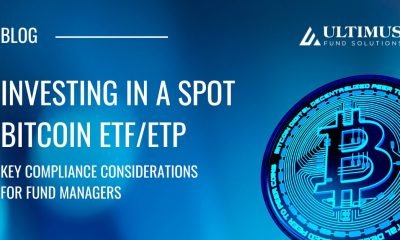COVID-19’s impact on financial markets has highlighted the need for active monitoring of legislation as well as tax and post-trade compliance for regulated investment companies, or RICs. COVID-19-related tax and economic relief benefited RICs directly and indirectly. In addition, market volatility has led to asset valuations that could push RICs out of compliance with requirements for special tax treatment.
Advisers may wonder how RICs, which are generally pass-through entities with no tax liability, benefit from pandemic-related tax and economic relief. Tax specialists at Ultimus, who closely monitor legislative guidance, explain:
- Benefit of tax filing extension. RICs represent a $25 trillion industry that is required to file tax returns on paper. At Ultimus, the tax team prepares the provisions for the tax returns, delivers those to the audit team for review and tax return preparation. After receiving the prepared returns from the audit firm, Ultimus disseminates them to respective trust officers for signature and coordinates the physical filing. This system provides many checks and balances between the tax team at Ultimus and the audit firm. However, with staff of many companies working remotely, the Federal income tax payment and filing extension afforded RIC fund administrators extra time to coordinate and obtain the necessary signatures.
The pandemic has highlighted once again the need for electronic filing of taxes. The Investment Company Institute submitted a request to the IRS to provide additional relief for RICs that included permitting IRS Form 1120-RICs to be signed and filed electronically. Although such relief has not been granted, it does highlight the need for tax policy change to support the RIC industry.
- Benefit of CARES Act. Congress passed the CARES Act to provide economic relief from COVID-19. While the CARES Act does not provide much direct relief for RICs, it does deliver an indirect benefit.
The CARES Act has a provision that may lessen the impact of section 163j, which limited business interest expense deductions to 30% of adjusted taxable income for a taxable year. The allowable deduction increased to 50% with the CARES Act. Funds with significant interest income and expenses are expected to benefit from this provision, so it is important for advisers and their fund administration tax teams to assess.
In close coordination with a RIC’s adviser team, a fund administrator compliance team should closely monitor the asset diversification and qualifying income requirements. Lack of compliance can have unwanted financial and tax results. COVID-19-related market volatility is therefore cause for review for both the pre-trade (adviser) and post-trade (fund administrator). The Ultimus compliance team utilizes our proprietary and robust, automated daily post-trade compliance system to test and review a RIC’s compliance.
- Asset diversification requirements. All RICs must meet the IRS 50% diversification requirement and 25% limitation on any one issuer. As asset values fluctuate, RICs and their advisers need to remain vigilant in monitoring compliance with these limitations.
The liquidity profile of investments might impair a RIC’s ability to sell an investment within allowable cure periods. Unexpected concentrations can also put market appreciation exceptions into question, causing RICs to execute trades in sub-optimal market conditions.
Advisers and fund administrators should be aware of less-liquid investments and the impact on asset diversification. The ability to trade out of investments may be impaired by liquidity fees and gates. Liquidity fees, which are intended as penalties for early redemption, diminish the return on that investment. Liquidity gates impair a RIC’s ability to exit an investment and may hinder its ability to take corrective action.
Fund administrators can alert advisers of potential issues ahead of fiscal quarter end and ensure actions are taken to keep the RIC compliant with diversification requirements. In cases when a RIC has breached the requirements, the administrator can assist advisers in returning the RIC to compliance within the cure period.
- Qualifying income requirements. All RICs must have at least 90% of gross income (inclusive of gross capital gains) derived from qualified income sources. Again, fluctuations associated with market volatility can push RICs into non-compliance.
Advisers may be familiar with the terms “good income” (qualifying income) and “bad income” (non-qualifying income). Market conditions have created situations where RICs have found bad income exceeding 10%. Such circumstances could be due to anticipated good income declining or to bad income-generating assets appreciating.
Advisers and their fund administrator should monitor investment models and holdings to ensure the RIC remains compliant with qualifying income requirements. Although there is a cure for failure to meet the 90% income test, the cost can be high and should be analyzed with the fund administrator tax team to understand potential ramifications.
The ever-evolving market conditions require hypervigilance to actively monitor tax and post-trade compliance. Engage a fund administrator with deep knowledge of tax and compliance to keep on track.
A knowledgeable fund administrator’s tax and compliance team, such as the team at Ultimus, can assist advisers and CCOs on various topics related to this such as:
- Review assets that generate bad income and the impact to the fund.
- Answer questions regarding the addition of non-qualifying assets to portfolio holdings and the associated impacts to the funds.
- Assist with developing options to correct potential failures ahead of fiscal year ends and help monitor compliance.
- Review potential new investments and their ability to generate good versus bad income.
The teams at Ultimus are here to support funds and will continue to share updates and provide guidance as legislation and rules are revised.
Ultimus Fund Solutions does not provide tax advice. Any statements contained herein are not intended to be construed (and shall not be construed) as tax advice, and any statements contained herein are not intended to be used (and cannot be used) for, the purpose of avoiding Federal, state, local, foreign, or other taxes or penalties. You should consult your tax adviser as to any tax related matters. The comments are as of May 11, 2020 and may not include any up to date IRS guidance that maybe released thereafter. For additional information please contact your tax and compliance team.




